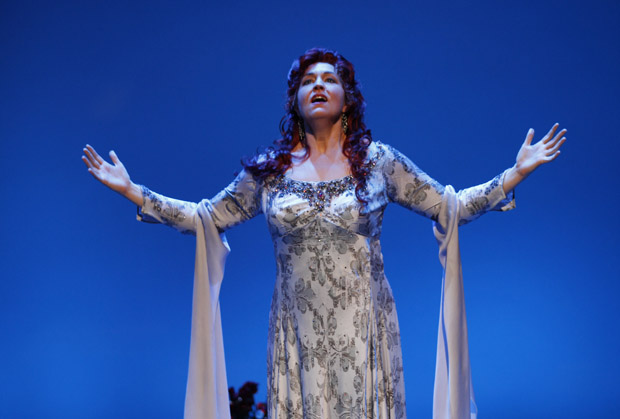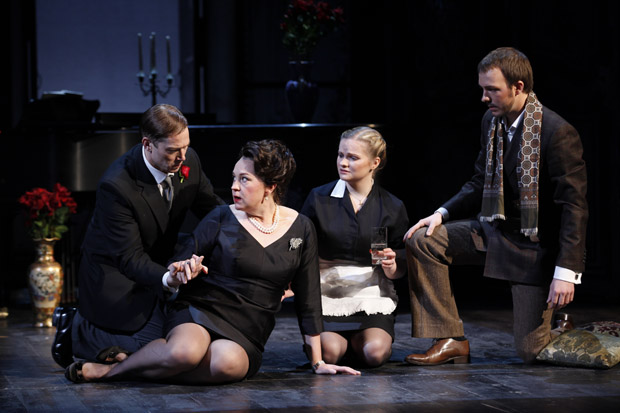The last new work New York City Opera produced -- Stephen Schwartz’s damp squib Séance on a Wet Afternoon -- was a failure both critically and to the company’s bottom line.
And so Sunday at BAM, one of City Opera’s temporary homes this season, with the New York premiere of an opera by singer-songwriter Rufus Wainwright, one couldn’t help but shake the sense of déjà-vu. This was aided by the fact that both Schwartz’s Séance and Wainwright’s Prima Donna both feature the luminous soprano Melody Moore. Moore, it turns out, is quite a catch in Prima Donna, Wainwright’s maiden voyage into the opera world and, according to the composer, the culmination of his artful pop canon and longstanding theatrical flair.
Wainwright gives opera diva Moore the monumental task of playing...an opera diva, the Québec-born, Paris-residing and aptly-named Régine Saint Laurent. She is a regal figure whose career took a premature turn towards reclusive retirement following an onstage breakdown during a new work: an opera based on the life of Eleanor of Aquitaine, a powerful patroness from the Middle Ages. Unsurprisingly, Wainwright took inspiration for this libretto (which he co-wrote with Bernadette Colomine) from Maria Callas, herself a figure shrouded in imperious mystery. Régine is planning a comeback in the same role and, on Bastille Day, 1970, draws back the veil on her life—first for a new maid and then for a journalist-cum-lover. Such exposure, it turns out, is too much.
With such a meta plot, Prima Donna could be an unholy mess, a piece of fanfiction by an overly involved opera queen. However, Wainwright sought to create with this work a “visceral, unintellectual experience.” And he (mostly) succeeds. The plot is keenly crafted, offering a select handful of twists and turns once the surface is scratched, and an ending that strips away the operatic melodrama and ends rather realistically and poignantly, a cool breeze following a hellishly hot climax. Wainwright borrows several elements from his favorite libretti, alluding at various turns to Adriana Lecouvreur, Madama Butterfly and La Rondine, but rather than seem contrived, these moments come across as knowing winks to the audience. The Pinkertonian return of the journalist in particular garnered a chorus of wry chortles.

Photo: Carol Rosegg
Musically, there’s less of a straight line. A rainy prelude plods with impressionistic undertones out of Ravel or Poulenc, mixed with Mascagni and even, in the harp lines, Thomas’s overture to Mignon. The entrance of Régine’s fey and fastidious butler, Philippe, seems like an early draft of Scarpia’s own arrival in Tosca. More subtly, an interview that turns into a master class with Régine coaching and singing the score to her Eleanor opera operates at a similar level to Lucia di Lammermoor, with characters relying on pre-fated roles as a mode of expressing their emotions. Undercutting it all is a periodically driving, hyperkinetic force for which Wainwright can thank Glass and Adams.
All in all, they aren’t bad composers to amalgamate and while the ensuing love child is not exactly profound, there's also enough original material to keep the work fresh and on course. At one point in the first act, Régine, following an aria that comes with the grainy nostalgia of a black and white French film, sings a barebreasted, steely benediction that would make Eleanor herself proud (though her second-act aria about a wolf comes across as a touch too metaphorical).
A duet from the Eleanor opera carries a whiff of Tudor court music but blooms into an exotic and overwhelming sense-memory. Régine’s maid Marie, pertly sung by last-minute-replacement Kathryn Guthrie Demos, cuts the Parisian bombast with a lilting Provincial air and stratospheric top notes. Tenor Taylor Stayton came across as more milquetoasty in the role of Andre le Tourneur, whose journalistic credentials give way to star struck groupie, though he rose to the challenge of his second act duet with Moore. Randal Turner’s Philippe came with a bitchy brooding that made for some cathartic outbursts and menacing interplay with Damos.

Photo: Carol Rosegg
At various turns, however, all four leads were overpowered by Wainwright’s overzealous orchestrations, conducted faithfully by Jayce Ogren. Wainwright professes that his profession as a performer lends itself nicely to the operatic form, but he would do well to remember that opera singers generally don’t work with amplification. Likewise, the orchestra’s string and woodwinds section, while sublime, were often undermined by a shopworn brass ensemble that seemed to be phoning in Wainwright’s numerous solos for trumpets and trombones. Director Tim Albery helped to create the fast-paced performance with natural yet operatic movement onstage, working with stylized sets and costumes by Antony McDonald that harkened to a tarnished bygone era. Thomas C. Hase’s lighting was at turns moody and moving.
In the opera’s onset, Philippe mourns the passing of Régine’s career, lamenting the glory days of his diva’s past through which he lived vicariously. “All of society came to see us,” he groans, later turning to a threadbare chaise and seething “My God, how shabby it is!” Wainwright, in originally writing this opera for the Metropolitan Opera (the production was dropped, partially due to the fact that Wainwright insisted on a French-language libretto), couldn’t have possibly foreseen the glaring allegory for how many people now view City Opera. However, productions such as this serve to remind us of the company’s importance and prowess, bringing to New York what other companies won't. How galvanizing, if not surprising, to see that such a mission remains the same—regardless of the theater. This may not be an opera to net a Pulitzer, but it's still infectious fun.